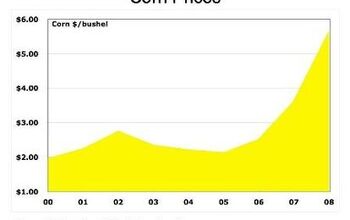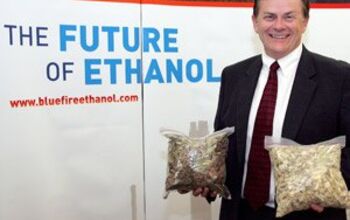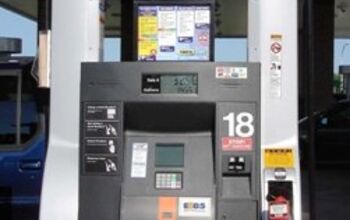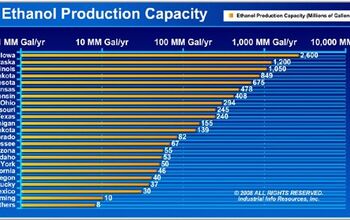E85 Boondoggle of the Day: Ethanol Losing the Blogging Wars
Dave Niles over at the Ethanol Producer Magazine‘s Talking Stock, I mean Taking Stalks, I mean Taking Stock blog reports an E85 industry milestone: their 200th “commercial scale” production facility. OK, it’s not actually here yet. In fact, the corn-based ethanol industry is in the middle of a huge E85 glut, they’ve lost the PR war on the “food for fuel” debate (where even GM’s FlexFuel ads are talking-up [theoretical] cellulosic supplies), new facilities are on hold and planning permission for future plants faces stiff not to say stifling local opposition. To be fair, Niles does mention one of those dark clouds: “Eight small-scale plants remain offline primarily due to market conditions.”And while we’re blogging stalks, I mean stalking blogs, I mean talking blogs, J.D. Power and Associates Web Intelligence Division’s surveyed some 40m blog posts over the last six months (using the algorithm method). “The topics of ethanol and biofuels generate lower amounts of positive sentiment than other forms of alternative energy.” But that’s OK because “consumers indicate that they are skeptical of marketing efforts by oil companies that promote their efforts to pursue green and renewable energy sources.”
More by Edward Niedermeyer


































Comments
Join the conversation
Excellent post menno…!! I consider that the oil changes are 50% less due to less sludge in my oil figure out oil changes at 6000 miles instead of 3000. I also will have my engine last 2x long because the oil is not contaminated with sludge causing friction wear. Talk to folks that use LPG they will help you understand the engine wear benefits. While I've seen evidence of LPG power vehicles allowing longer oil changes because of less contamination in the oil, I've yet to see any evidence that supports this for gasoline with ethanol. I would say longer oil changes are possible today with conventional motor oils because these oils improved so much in the last 10-20 years. The oil industry in the US switched their conventional motor oils over to hydrocracked Group II base oils in the late 1990's early 2000's. These Group II base oils used in modern conventional oils (SM/GF-4 specifications) are far superior to the Group I solvent refined oils we were using in the 1970/80's for 3,000 mile oil changes.
The oil industry in the US switched their conventional motor oils over to hydrocracked Group II base oils in the late 1990’s early 2000’s. This assuming you are gettin what you buy. The cans of motor oil when we studied seem to be this and that at the sellers descretion. The filth that is created by the gasoline engine burning or not buring the gasoline is what troubles the good or bad oil that the seller is giving you. The better or not so good senario for oil is not relevant since you cannot control what you are buying. So, the situation is burn something that is not so miserable like pure gas, try E85 burns a lot cleaner. Whenever oil is without contamination the oil will prevent 99% of friction wear. By the way, Since Japanese and Korean cars are so good, why don't they pressurize the oil system prior to startup there by eliminating dry start up wear? Dry startup wear is where most friction wear takes place if the oil is good. The 3000 mile oil changed is based on how many gallons of gas you were expected to burn in 3000 miles not the quality of oil. We burned about 300 gallons of gas with a 10 mpg car. Our cars started getting around 20mpgh so 300 gallons of gas was hit at 6000 miles. If your concerned about ehtanol efficiencey, a high compression car will improve gas mileage. The ethanol replaced the additive that the government mandated that was a deriviative of natural gas. This derivative poluted the underground water and was a lighter than water molecule. This meaning you cannot filter it out. The oil companies fought hard to eliminate their liabilites through law but failed. Once they were held liable for their damages they swithched to ethanol for air quality standards. Since, all this complaining I hear comes without much common sense. I believe you folks must be bloggers. We pay our troups to protect Korea and Japan to reduce the costs of the cars they sell us. Remember get off the roads they are 100% built with tax dollars. And, remember do nothing unless it is 100% effective immeidately.
"I wonder if the Gulf of Mexico plume resembles the plume resulting from one Mississippi River oil tanker spill? The impact of oil spills tend to last decades. Just wondering." No, the plume is much bigger and persistent, and can be seen from orbit. Also, it is not an accident. It is a known result of actions that farmers continue to make every day.
No, the plume is much bigger and persistent, and can be seen from orbit. Also, it is not an accident. It is a known result of actions that farmers continue to make every day. The plume much be stopped immediately. Now, don't worry since all the corn we grow was changed from people food to ethanol for gas and we deprived the starving masses of cheap food. But since the plume must be stopped because it is killing the clams that cannot swim away, we must stop growing the corn for cheap food. See, we have a win win. Clams live and no corn for ethanol.